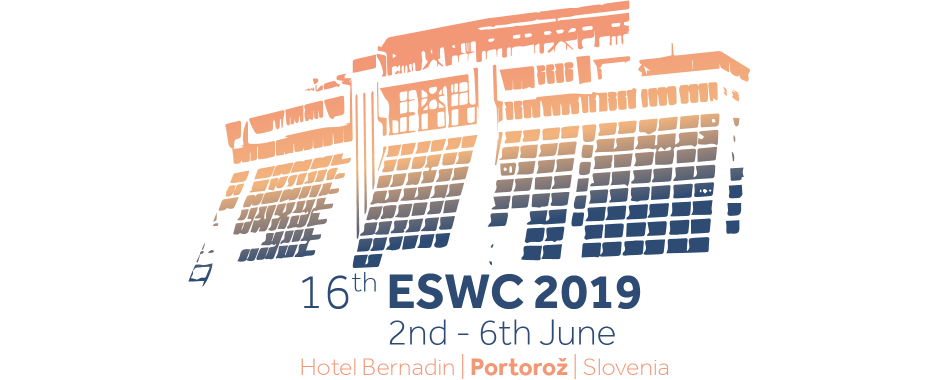Co-located workshops at the ESWC conferences are essential meeting points for discussing ongoing work and current results, as well as shaping new ideas and research fields. We particularly invite workshop proposals looking at Semantic Web related topics from an interdisciplinary standpoint, proposals focussing on novel aspects of the Semantic Web and Web of Data, and proposals aiming at gathering existing and forming new sub-communities. We encourage the submission of workshop proposals on:
- Fundamental technical and theoretical problems of the Semantic Web / Linked Data and Knowledge Graph;
- Applications of Semantic Web technologies in domains such as Mobility and Smart Cities, Life Sciences, Industry 4.0, Earth Science, Digital Humanities, Law, Media, etc.;
- Key enabling technologies and their adaptation to the needs of the Semantic Web;
- Aspects of Semantic Web research that have been neglected or underrepresented so far;
- Techniques and methods from other research fields that are of relevance for Semantic Web research (e.g., artificial intelligence, databases, NLP, big data analytics, machine learning, human computer interaction, information retrieval, web science, etc.); and
- New emerging topics and areas.
In particular, we also encourage the submission of workshops that do not follow the the typical workshop format of a mini-conference.
General Information and Criteria
Each proposal will be reviewed by the members of the workshop programme committee, and ranked based on the overall quality of the proposal and the workshop’s fit to the conference as detailed below. The criteria for judging the quality of workshop proposals are as follows:
- Workshops cover topics falling in the general scope of the ESWC conference.
- Clear demonstration that the workshop will be able to attract participants.
- Workshops should have a clear focus on a specific technology, problem or application.
- There is a community interested in the workshop’s topic.
- Workshops are intended to be genuine interactive events and not mini-conferences. Workshops with creative structures and organisations that attract various types of contributions and ensure rich interactions are welcomed.
- Workshop duration is normally expected to be half a day or a full day.
- We strongly advise having more than one organiser and no more than four, preferably from different institutions, bringing different perspectives to the workshop topic.
Please note that the duration of a workshop might need to be adjusted based on the overall number of workshop submissions received.
Workshops need to clearly describe how they are planning to attract a sufficient number of participants. Workshops that have less than 10 people registered at the early registration deadline might be canceled.
The organisers of accepted workshops will be responsible for their own reviewing process, publicity (e.g., website, timelines and call for papers), and proceedings production. Workshop organisers will be required to publish their program schedule as RDF.
The organisers will also be required to closely cooperate with the Workshop Chairs and the ESWC 2019 Local Chairs to finalise all organisational details.
Workshop attendees must register for the workshop as well as for the main conference days.
Important Dates
- Workshop proposals due: November 23rd, 2018 – 23:59 Hawaii Time
- Notification of acceptance: December 3rd, 2018 – 23:59 Hawaii Time
- Workshop website due: December 20th, 2018 – 23:59 Hawaii Time
- Workshop camera-ready proceedings due: May 3rd, 2019 – 23:59 Hawaii Time
- Workshop days: 2nd and 3rd of June, 2019
Suggested Timeline for Workshop Papers
- Submission deadline: Friday March 1st, 2019
- Notifications: Friday March 29th, 2019
- Camera-ready version: Friday April 12th, 2019
Submission Guidelines
Workshop proposals have to be submitted via EasyChair at https://easychair.org/conferences/?conf=eswc2019workshoptuto
Each proposal must consist of a single PDF document written in English, not longer than four pages, which contains the following information:
- The title and abstract, 200 words maximum, for inclusion on the ESWC 2019 website.
- A brief discussion of why the topic is of particular interest at this time.
- A brief description of why and to whom the workshop is of interest, the workshop audience, as well as the expected number of participants.
- A brief description (draft outline) of the proposed workshop format, discussing the mix of events and activities such as paper presentations, invited talks, panels, hacking sessions, breakout sessions, or general discussion slots, and an approximate timeline.
- A description of the target audience and expected number of participants
- A list of (potential) members of the program committee (at least 50% have to be known and confirmed at the time of the proposal).
- An indication of whether the workshop should be considered for a half-day or full-day event.
- Related workshops and conferences, i.e. specify if this is the continuation of a workshop series or is a new workshop to address an emerging issue. Please provide information about past versions of this workshop and other related workshops (including URLs and submission / acceptance counts, if available).
- Names and contact information of the workshop organisers/chair(s) (name, affiliation, email address, homepage and short (one paragraph) biography of each chair, explaining the chair’s expertise for the workshop including past experience in organising / facilitating workshops). Preferably provide a single contact person per submission.
The best papers from each workshop may be included in the supplementary proceedings of ESWC 2019, which will appear in the Springer LNCS series.
Share on
